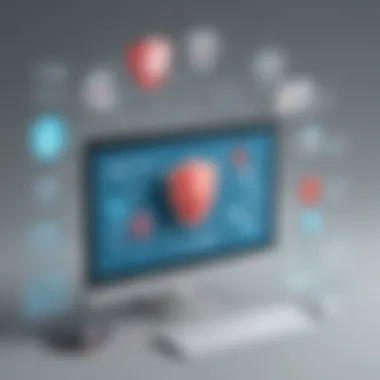The Evolution of Medical EHR Companies: A Detailed Analysis of Transformation and Innovation


Industry Overview
Medical Electronic Health Record (EHR) companies have undergone a remarkable evolution, profoundly impacting healthcare delivery worldwide. These companies play a pivotal role in the digitization of medical records, streamlining processes for healthcare professionals, and ultimately enhancing patient care. The advancements in technology have enabled EHR systems to become indispensable tools in modern healthcare settings.
Current Trends in the Industry-specific Software Market
One of the key trends in the medical EHR industry is the shift towards cloud-based solutions. This trend offers scalability, flexibility, and enhanced security for healthcare organizations. Additionally, the integration of artificial intelligence (AI) and machine learning algorithms is revolutionizing data analysis and predictive modeling within EHR platforms.
Key Challenges Faced by Buyers in the Industry
Buyers in the medical EHR industry often encounter challenges related to interoperability and data security. Ensuring seamless communication between different systems and safeguarding patient information against cyber threats are among the primary concerns for healthcare providers when selecting an EHR solution.
Emerging Technologies Impacting the Industry
The emergence of blockchain technology holds promise for enhancing data integrity and security within EHR systems. By leveraging blockchain, medical EHR companies can create immutable audit trails, ensuring the authenticity and privacy of patient records.
Top Software Options
When exploring the landscape of medical EHR companies, it is essential to review the leading software providers that drive innovation and set industry standards.
Review of Leading Software Providers in the Industry
Companies such as Epic Systems, Cerner Corporation, and Allscripts Healthcare Solutions are at the forefront of developing comprehensive EHR solutions tailored to meet the diverse needs of healthcare organizations.
Feature Comparison of Top Software Solutions
A comprehensive analysis of the features offered by different EHR software providers can help healthcare organizations make informed decisions based on their specific requirements, such as interoperability, usability, and customization options.
Pricing Structures of Different Software Options
Understanding the pricing structures of various EHR software options is crucial for budget planning and cost-effectiveness. Pricing models may vary based on licensing, implementation, and additional modules or services.
Selection Criteria
Selecting the right EHR software for a healthcare organization involves careful consideration of several key factors to ensure a successful implementation and utilization of the system.
Important Factors to Consider When Choosing Software
Factors such as software scalability, user experience, vendor reputation, regulatory compliance, and technical support options are vital considerations during the software selection process.
Common Mistakes to Avoid During the Selection Process
Avoiding common pitfalls like inadequate system testing, overlooking user training requirements, and neglecting data migration planning can prevent setbacks and optimize the implementation of an EHR solution.
How to Determine the Right Fit for Your Business Needs


Aligning the features and capabilities of an EHR system with the specific needs and workflows of a healthcare organization is essential for maximizing efficiency and enhancing patient care outcomes.
Implementation Strategies
Implementing an EHR system involves a series of best practices to ensure a smooth transition and integration with existing healthcare systems and processes.
Best Practices for Smooth Implementation of Software Solutions
Effective change management, stakeholder engagement, comprehensive training programs, and well-defined implementation timelines are key components of a successful EHR implementation strategy.
Integration with Existing Systems and Processes
Seamless integration with existing electronic systems, such as practice management software and laboratory information systems, is critical for maintaining continuity in patient care delivery and data exchange.
Training and Support Resources for Successful Deployment
Offering extensive training resources, user support, and access to technical assistance can facilitate the adoption of EHR technologies across all levels of healthcare staff, ensuring a successful deployment.
Future Trends
The future of medical EHR companies is shaped by emerging technologies and evolving industry dynamics that are anticipated to drive significant changes in healthcare delivery.
Predictions for the Future of the Industry-specific Software Landscape
The integration of telemedicine capabilities, advances in data analytics, and the emphasis on patient engagement are expected to influence the direction of EHR software development and implementation in the coming years.
Upcoming Technologies Shaping the Industry
Technological advancements such as Internet of Things (IoT) integration, virtual reality applications in healthcare, and enhanced cybersecurity measures will dictate the innovation and competitiveness of medical EHR companies moving forward.
Recommendations for Future-Proofing Your Technology Stack
To stay ahead in a rapidly evolving industry landscape, healthcare organizations are advised to invest in scalable, interoperable EHR solutions, prioritize data security measures, and adapt to regulatory changes proactively to future-proof their technology infrastructure.
Introduction to Medical EHR Companies
In the intricate world of modern healthcare, the advent of Electronic Health Records (EHR) has been a transformative force. The bedrock of efficient healthcare delivery, EHR systems have revolutionized the way medical information is stored, accessed, and utilized. This article embarks on a journey to unravel the essence of Medical EHR Companies, delving into their genesis, growth, and impact on the healthcare landscape.
Defining Electronic Health Records (EHR)
Electronic Health Records, commonly known as EHR, encapsulate comprehensive digital records of patients' medical history, treatments, diagnoses, allergies, and various other healthcare-related information. These electronic records serve as a digital counterpart to traditional paper-based medical records, enabling healthcare providers to access, update, and share patients' information efficiently and securely. As a cornerstone of modern healthcare systems, EHR promotes seamless information exchange, enhances patient care coordination, and fosters data-driven decision-making.
Importance of EHR in Healthcare
The importance of EHR in healthcare cannot be overstated. By transitioning from paper-based records to electronic formats, healthcare organizations have witnessed a paradigm shift in operational efficiency, clinical accuracy, and patient outcomes. EHRs play a pivotal role in enhancing care quality, streamlining administrative tasks, reducing medical errors, and facilitating communication among healthcare professionals. Moreover, EHR systems empower patients to actively engage in their healthcare journey, promoting transparency, empowerment, and personalized care.


Overview of Medical EHR Companies
Against the backdrop of escalating healthcare demands and technological advancements, a myriad of companies have entered the realm of Medical EHR, offering innovative solutions to meet the industry's evolving needs. These companies design, develop, and implement EHR software tailored to diverse healthcare settings, ranging from small private practices to large hospital systems. As key players in the healthcare ecosystem, Medical EHR Companies continuously strive to enhance usability, interoperability, and data security in their solutions, aligning with regulatory requirements and industry standards.
Evolution of Medical EHR Companies
In the vast landscape of healthcare, the Evolution of Medical EHR Companies stands as a pivotal element driving transformative changes. Understanding this evolution is crucial in comprehending the trajectory of healthcare delivery globally. From the early days of paper-based records to the digital revolution, EHR companies have revolutionized how patient data is managed and utilized. The shift towards electronic records has significantly enhanced efficiency, accuracy, and accessibility in healthcare settings, highlighting the indispensable role of EHR companies in modern healthcare systems.
Early Pioneers in the EHR Industry
The emergence of early pioneers in the EHR industry laid the foundation for the technological advancements witnessed today. Visionary individuals and companies were instrumental in conceptualizing and introducing Electronic Health Records when the concept was still in its nascent stages. These pioneers navigated through challenges and skepticism, demonstrating the potential of digital health records in improving patient care and streamlining healthcare workflows. Their innovative approaches and perseverance paved the way for the widespread adoption of EHR systems across the healthcare sector.
Technological Advancements in EHR Systems
The evolution of EHR systems has been marked by continuous technological advancements that have redefined how healthcare data is captured, stored, and utilized. Innovations such as cloud computing, interoperability protocols, and artificial intelligence have revolutionized EHR functionalities, enhancing data accuracy, security, and accessibility. These technological advancements have not only improved healthcare delivery but have also opened new possibilities for personalized medicine, data analytics, and population health management within the healthcare ecosystem.
Adoption and Integration of EHR Platforms
The adoption and integration of EHR platforms have been crucial in optimizing clinical workflows, enhancing care coordination, and supporting data-driven decision-making in healthcare settings. Healthcare organizations worldwide have been investing in robust EHR systems to streamline operations, improve patient outcomes, and comply with regulatory standards. The seamless integration of EHR platforms with existing healthcare infrastructures has facilitated interoperability, data exchange, and continuity of care, marking a paradigm shift in how healthcare information is managed and shared.
Regulatory Landscape and EHR Compliance
Navigating the complex regulatory landscape and ensuring EHR compliance are central considerations for medical EHR companies. Stricter regulations and mandates aim to safeguard patient data privacy, enhance data security, and promote interoperability among healthcare systems. EHR companies play a crucial role in adhering to regulatory requirements, implementing secure data practices, and fostering standardized data exchange to ensure compliance with industry standards and safeguard patient information across the healthcare continuum.
Key Players in the Medical EHR Industry
In the realm of medical EHR companies, the segment focusing on Key Players holds pivotal importance. These are the industry giants, the trendsetters whose innovations and strategies significantly influence the direction and growth of the sector. Understanding the landscape of Key Players in the Medical EHR Industry is crucial for stakeholders seeking to stay abreast of the latest developments and make informed decisions. By analyzing the top players, market dynamics, and competitive strategies, one can gain valuable insights into the evolution and future trajectory of medical EHR solutions.
Top Medical EHR Companies
Among the top echelon of Medical EHR Companies are established names renowned for their cutting-edge technologies, user-friendly interfaces, and seamless integration capabilities. These companies have earned their position through years of consistent innovation, customer satisfaction, and adherence to industry standards. Examples include companies that offer comprehensive EHR suites with functionalities ranging from electronic medical records to practice management tools. The distinction of being a top player in this arena is not merely about market share but also about driving innovation, setting benchmarks for quality, and enhancing the overall healthcare ecosystem through technology.
Market Share and Competitive Analysis
An in-depth analysis of market share and competitive landscape provides invaluable insights into the dynamics shaping the Medical EHR Industry. Understanding the market share of key players reveals their dominance, market positioning, and potential areas of growth or vulnerability. Competitive analysis sheds light on the strategies adopted by different companies to gain a competitive edge, expand their market presence, and differentiate their offerings. By delving into market share trends and competitive tactics, stakeholders can anticipate market shifts, identify strategic partnerships, and capitalize on emerging opportunities in the fiercely competitive EHR landscape.
Emerging Players and Disruptors
While established players command a significant market share, the role of Emerging Players and Disruptors is equally compelling. These companies introduce fresh perspectives, novel technologies, and disruptive business models that challenge the status quo and push the boundaries of innovation in medical EHR solutions. Emerging Players often bring agility, creativity, and unconventional approaches to the table, driving industry-wide transformation and redefining traditional practices. By closely examining these disruptors, industry watchers can gain foresight into potential future trends, market disruptions, and paradigm shifts that could shape the next phase of evolution in the Medical EHR Industry.
Challenges Facing Medical EHR Companies
In delving into the extensive realm of medical EHR companies, it becomes evident that they encounter multifaceted challenges that significantly impact their operations and overall effectiveness within the healthcare landscape. As pivotal entities driving the evolution of healthcare delivery, these companies must navigate through a myriad of obstacles to ensure seamless functionality and optimal patient care. The importance of addressing these challenges lies in enhancing the efficiency, accuracy, and accessibility of electronic health records, ultimately leading to improved healthcare outcomes and patient satisfaction.
Interoperability and Data Exchange


One of the paramount challenges facing medical EHR companies is the issue of interoperability and data exchange. The seamless exchange of health information among different systems and healthcare providers is imperative for delivering coordinated and comprehensive patient care. However, interoperability barriers, such as incompatible data formats and systems, pose significant hurdles that impede efficient data sharing. Addressing these challenges requires the development and adoption of standardized protocols and technologies to ensure interoperability across various platforms, fostering seamless data exchange and continuity of care.
Data Security and Privacy Concerns
Data security and privacy concerns stand as another critical challenge for medical EHR companies, given the sensitive nature of healthcare information stored within electronic records. Ensuring the confidentiality, integrity, and availability of patient data is paramount to maintaining trust and compliance with regulatory standards. Cybersecurity threats, data breaches, and unauthorized access present tangible risks that necessitate robust security measures and stringent privacy protocols. By implementing encryption techniques, access controls, audit trails, and regular security assessments, EHR companies can mitigate vulnerabilities and safeguard patient information from potential breaches and unauthorized disclosures.
User Experience and Interface Design
Moreover, user experience (UX) and interface design pose significant challenges for medical EHR companies seeking to enhance usability and functionality for healthcare professionals. The user interface plays a pivotal role in the adoption and clinical utility of EHR systems, impacting overall user satisfaction and workflow efficiency. Complex and non-intuitive interfaces can impede user interaction, leading to user frustration and suboptimal utilization of EHR functionalities. By prioritizing user-centered design principles, intuitive navigation, customization options, and user-friendly interfaces, EHR companies can optimize the user experience, streamline clinical workflows, and drive greater adoption among healthcare providers.
Future Trends in Medical EHR Technology
In the realm of medical Electronic Health Record (EHR) companies, focusing on future trends is paramount for staying ahead in the ever-evolving landscape of healthcare technology. The integration of innovative technologies plays a pivotal role in enhancing patient care, optimizing workflow efficiency, and ensuring data security within EHR systems. Understanding and adapting to these trends not only meets the demands of the industry but also sets the stage for providing invaluable services to healthcare providers and patients alike.
Artificial Intelligence and Machine Learning
Artificial Intelligence (AI) and Machine Learning (ML) are revolutionizing the healthcare sector, offering tremendous potential for improving the quality and efficacy of EHR systems. By leveraging AI and ML algorithms, medical EHR companies can automate tasks, analyze vast amounts of data quickly, and provide valuable insights for clinical decision-making. These technologies enhance diagnostic accuracy, personalize treatment plans, and streamline administrative processes, ultimately leading to more efficient and patient-centered care delivery.
Telemedicine Integration and Remote Care
The integration of telemedicine and remote care functionalities into EHR systems bridges geographical barriers and expands access to healthcare services. Telemedicine allows for virtual consultations, remote monitoring of patients' health, and timely interventions, particularly beneficial for individuals in remote or underserved areas. Seamless integration of telemedicine within EHR platforms enables healthcare providers to deliver comprehensive care beyond traditional clinical settings, improving patient outcomes and enhancing overall healthcare accessibility.
Cloud-Based EHR Solutions
Cloud-based EHR solutions offer scalability, flexibility, and enhanced data security for medical practices and healthcare organizations. By migrating to the cloud, EHR companies can store, manage, and access patient information securely from anywhere, at any time. Cloud-based systems ensure real-time collaboration among healthcare teams, facilitate interoperability between different healthcare stakeholders, and enable continuous updates and backups, reducing the risk of data loss and enhancing operational efficiency.
Blockchain Technology in Healthcare Records
Blockchain technology holds promise in transforming the management of healthcare records within EHR systems. By providing a decentralized and secure platform for storing and sharing patient data, blockchain ensures data integrity, transparency, and privacy. Implementing blockchain in EHR systems improves data accuracy, reduces the likelihood of data breaches, and enhances trust among healthcare providers, patients, and third-party entities. The tamper-resistant nature of blockchain technology enhances the verifiability and reliability of healthcare data, laying the foundation for a more secure and interconnected healthcare ecosystem.
Conclusion
In this comprehensive analysis of the evolution of medical EHR companies, it is evident that the topic of conclusion holds utmost significance. Understanding the past developments, current challenges, and future trends in the EHR industry provides key insights into how healthcare delivery has transformed. By reflecting on the journey of EHR companies from their inception to their current state, stakeholders can better grasp the nuances of this innovative sector. The conclusion section acts as a pivotal point in summarizing the critical aspects discussed throughout the article, offering a holistic view of the opportunities and obstacles faced by medical EHR companies.
Summary of Key Findings
As we delve into the landscape of medical EHR companies, several key findings emerge. The evolution of EHR systems has revolutionized the healthcare industry, enhancing data management, improving patient care, and streamlining administrative processes. Key players in the EHR market have played a significant role in driving innovation and setting benchmarks for efficiency and effectiveness. Challenges such as interoperability, data security, and user experience have been identified as areas needing continuous enhancement to maximize the potential of EHR technology. Moreover, the future trends indicate a shift towards incorporating artificial intelligence, telemedicine, cloud solutions, and blockchain technologies into EHR systems, paving the way for a more interconnected and efficient healthcare ecosystem.
Implications for Healthcare Providers and Patients
The implications of the evolution of medical EHR companies extend far beyond the corporate realm, deeply impacting healthcare providers and patients. For healthcare providers, embracing EHR technology presents opportunities to enhance clinical decision-making, optimize resource allocation, and improve patient outcomes. Efficient EHR systems can streamline workflows, reduce administrative burden, and facilitate comprehensive patient care coordination. Patients, on the other hand, benefit from increased data accuracy, improved accessibility to their health records, and enhanced communication with healthcare providers. The evolution of EHR companies reflects a shift towards patient-centered care, empowering individuals to actively participate in their health management journey while fostering greater transparency and collaboration within the healthcare landscape.
Looking Ahead: The Evolution of Medical EHR Companies
Looking towards the future, the evolution of medical EHR companies is poised to continue on an upward trajectory, driven by innovation, regulatory changes, and shifting consumer demands. Integrating advanced technologies like artificial intelligence and machine learning will enable EHR systems to provide predictive analytics, personalized treatment recommendations, and anticipatory healthcare services. The seamless integration of telemedicine platforms into EHR solutions will redefine how healthcare is delivered, making remote care and teleconsultations more accessible and efficient. Cloud-based EHR solutions will enhance scalability, interoperability, and data security, further solidifying the foundation for a digitally connected healthcare ecosystem. Embracing blockchain technology in healthcare records will revolutionize data management, ensuring enhanced security, privacy, and transparency in health information exchange. As medical EHR companies navigate through these transformative changes, collaboration, innovation, and adaptability will be paramount in shaping a future where technology drives efficiency, accessibility, and quality in healthcare delivery.



